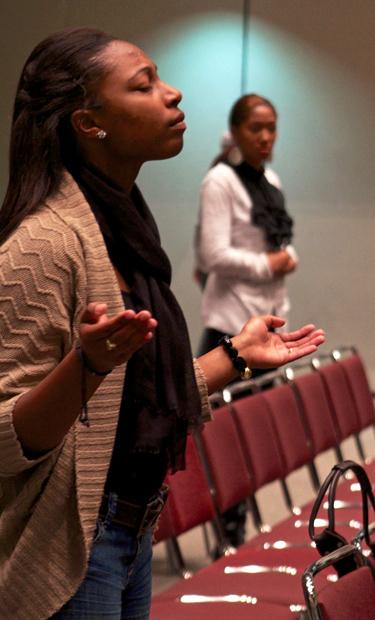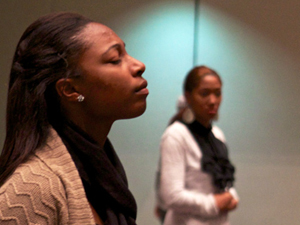
Travis Baluyot grew up in a Catholic household, but when the mechanical engineering major goes about his day he seldom prays or gestures the sign of the cross for blessing, and doesn’t go to mass.
“I mean, I still have a cross in my car whenever I drive,” Baluyot said. The senior at CSUN is a local example of a growing segment of Americans who do not identify with any religion, according to a new study by The Pew Research Center.
The Pew study, released in October, indicates that unaffiliated Americans now make up 20 percent of the nation’s population, and of these, a third are under the age of 30, a 5 percent increase within the past five years.
Rick Talbott, chair of religious studies, said the Pew data may be an oversimplification of a complex subject, and stresses the importance of putting the data into context before being interpreted. He pointed out that the increase in the unaffiliated does not mean a sudden exodus of religious people to atheism or agnosticism. In fact, according to the Pew research, 68 percent of the unaffiliated believe in a God or consider themselves spiritual.
“I fall into that category actually,” Baluyot said.
Church was never a priority, but rather an obligation through his parents, he said.
“Maybe I considered going on my own, but then I never really took it seriously,” Baluyot said.
He has developed a diplomatic outlook on religion recognizing that some people have a need for it, while others may have apathy. Dually, Baluyot discerns that no particular aspect of religion either pushed him away or drew him to it.
“I feel like I already understand enough about it. I know that being a good person is probably enough,” Baluyot said.
Talbott postulates that the large number of unaffiliated young people, people like Baluyot, is a result of their needs being met with resistance, and sometimes hostility, by religious institutions.
“The person who lives in our culture kind of has to hold these things in tension,” Talbott said. “In this culture, people are able to find meaning and purpose outside of religion, especially if the religion is oppressive.”
According to Talbott, the under-30 category is suggestive of a generation of individuals fluent in a diverse culture that may be turned off by their religion’s stance on friends of another belief and in some cases science.
“Religion follows trends and if institutions aren’t sensitive to these cultural trends they’re going to lose members, and they’re going to lose a lot of them before it’s over,” Talbott said.
An intellectual belief in a God or deity is a fraction of what constitutes religion, he said. Other facets include community participation and religious gathering, and for some religion is a motivational tool.
“I’m not saying classic religion is the only thing that does that, I’m just saying that that’s part of what it means to be a human being,” said Talbott. “If you’re trying to say the best hope of the world is science, well, that’s a type of belief and value system right there.”
The Pew study itself suggests that the increase of unaffiliated may be a matter of Americans, with little to no involvement in religious services, simply choosing to relinquish religious branding. In the past, this same group was less willing to do so, a 10-point drop from 60 percent to 50 percent since 2007.
But despite what the study shows about the U.S., religion on a global scale is on the rise, according to Talbott.
Noticeably absent within the Pew data is a wide degree of ethnic and religious diversity. Buddhists and Muslims are never mentioned as well as the growing Asian population within America, which may suggest that the Pew study may be less about the religious whole and more a barometer on the state of American Christianity.
Fourteen of the 18 religious student clubs at CSUN are Christian affiliated, however, the makeup of CSUN’s student population may indicate that the school isn’t entirely reflective of the Pew report.
As of Fall 2012, 35 percent of the school population is Hispanic, 11 percent Asian, 6 percent African American, and around 29 percent white.
Dainia Jones, president of the Virtuous Women club at CSUN, confesses that the Pew results worry her, but only because it may be saying things about Christianity. Jones, who started Virtuous Women this year, has noticed a decline in religion on campus and attributes it to religious hypocrisy, or “church-hurt” in her own words.
“They’ll be around Christians, or they’ll go to the church and then they’re ostracized by Christians, or judged and criticized. Of course they’re not going to want to be a part of that,” said Jones, citing Mathew 7:20, which says that people will be judged by their “fruit” or actions. “Our lifestyle is supposed to minister to other people,” said Jones, expressing that the study’s findings also motivate her to lead by example, to not just preach her beliefs, “but to live it.”





